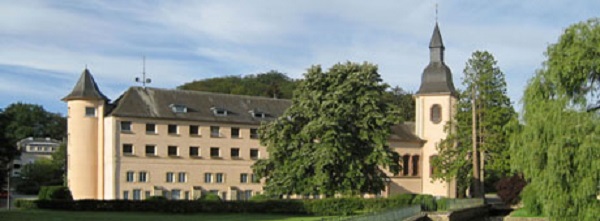
The Luxembourg European Anglophone Theatre Summer School (LEATSS) will hold a one-week residential course on "Shakespeare, what did he ever do for us" from Saturday 23 to Sunday 31 July 2016 in Clairefontaine, its 29th such summer school in Luxembourg.
Leaders: Summer School: Chris White, Helen Ireland, Janice Dunn and Phil Clark; Workshops: Graeme du Fresne (singing), John Gillet (acting), Simon De Deney (storytelling).
William Shakespeare died in 1616 and even now, 400 years on, his plays are still continuously performed across the globe. The body of work that Shakespeare created remains the single most influential on English language and western dramatic literature. So there we have it then: William Shakespeare is the most popular performed and studied playwright in the English language and western culture. The Bard is dead, long live the Bard! In honour of his achievement, the THEME options for 2016 will concentrate on the work of the Bard and beyond, tackling his own work and various aspects of his influence and legacy.
Why is it that many of us – in spite of his popularity – are often daunted and deterred by the prospect of performing Shakespeare? How do we make his long and seemingly complicated texts speak in ways that audiences can easily understand; how can we deal with the language, the imagery, the devices, the complex plots? Our experienced tutors will use their knowledge and understanding to address these concerns, demystifying and making Shakespeare’s work accessible. In a way it already is because he wrote about the human condition. His characters fall in love, and out of it, take a dislike to each other, betray each other, misunderstand each other, argue, fight and kill each other, are angry, sad, happy, jealous, envious, distrustful, untrustworthy, deceptive, magnanimous and forgiving – experiencing practically every human emotion you can think of, and every human situation.
As well as dealing directly with the Bard, the course shall be looking beyond, to Shakespeare’s legacy, investigating some of the ways the influence of Shakespeare is still felt. As a writer, Shakespeare invented a large number of words, many of which are still in common usage today. We shall be looking at some of the modern writers who have also pushed the boundaries of language, such as Caryl Churchill and Howard Barker. Shakespeare created great moral dramas, focussing on the personal (as opposed to God-given) responsibility of people in positions of great authority. The course shall look at modern plays dealing with such issues such as Sink the Belgrano (the Falklands War) and Becket (Thomas à Becket). It might also take the opportunity to look at the work of Bertolt Brecht who was hugely influenced by Shakespeare notably in the use of the ‘Bare Stage’. A fourth strand will look at music in Shakespeare. Although not innovative in this sense, Shakespeare used music and singing in different ways much as modern drama does, influenced especially by the use of music in film. What songs could we use today to enrich performance? How to employ this music to serve the play? And finally, how much would Shakespeare relish seeing his plays as musicals? The course shall enjoy visiting some, such as ‘Kiss Me Kate’.
The cost to attend is €560 (day student, incl all meals) or €800 (incl accommodation and all meals).
For further details, see www.leatss.lu.








